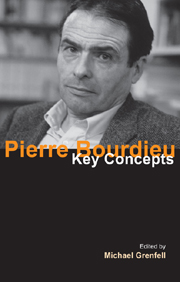Book contents
- Frontmatter
- Contents
- Contributors
- Acknowledgements
- Introduction
- PART I BIOGRAPHY, THEORY AND PRACTICE
- 1 Biography of Bourdieu
- 2 Theory of practice
- PART II FIELD THEORY: BEYOND SUBJECTIVITY AND OBJECTIVITY
- PART III FIELD MECHANISMS
- PART IV FIELD CONDITIONS
- Conclusion
- Postscript: methodological principles
- Chronology
- Bibliography
- Index
2 - Theory of practice
from PART I - BIOGRAPHY, THEORY AND PRACTICE
- Frontmatter
- Contents
- Contributors
- Acknowledgements
- Introduction
- PART I BIOGRAPHY, THEORY AND PRACTICE
- 1 Biography of Bourdieu
- 2 Theory of practice
- PART II FIELD THEORY: BEYOND SUBJECTIVITY AND OBJECTIVITY
- PART III FIELD MECHANISMS
- PART IV FIELD CONDITIONS
- Conclusion
- Postscript: methodological principles
- Chronology
- Bibliography
- Index
Summary
Introduction
Inevitably, central to this chapter is Bourdieu's Outline of a Theory of Practice (Bourdieu 1977b) which is a translation and revision of Esquisse d'une théorie de la pratique: Précédé de trois études d'ethnologie kabyle (originally published in 1972). Before coming to an assessment of the “theory” which Bourdieu advanced in these two texts, however, there is the need to interpret some aspects of his social and intellectual trajectory in the first forty years of his life (1930–70). This chapter will also consider the importance of Le métier de sociologue (originally published in 1968), translated as The Craft of Sociology (Bourdieu et al. 1991b) and comment on the relationship between Bourdieu's thinking and that of Bachelard, Althusser and Habermas among others.
Social and intellectual trajectory
As if reaffirming his normal reluctance to divulge details of his upbringing, it was only late on in his posthumously published Esquisse pour une auto-analyse (Bourdieu 2004a) that Bourdieu finally articulated an account of his origins, devoting several pages to a description of both of his parents. As outlined in Chapter 1, we know that his father was the son of a “métayer” – a farmer holding land on condition that half the produce is given to the landlord – who, at the age of about thirty, when Bourdieu was born, became postman, and then the postmaster, in a small village about twenty kilometres south of Pau in the Béarn in the direction of the omnipresent barrier of the Pyrenees dominating the sky-line.
- Type
- Chapter
- Information
- Pierre BourdieuKey Concepts, pp. 27 - 40Publisher: Acumen PublishingPrint publication year: 2008
- 5
- Cited by

